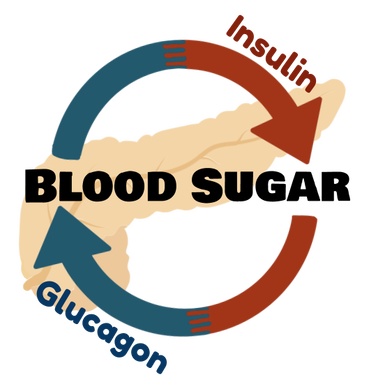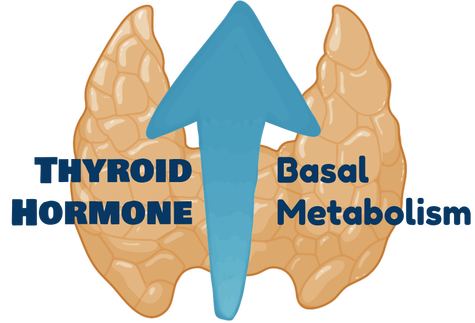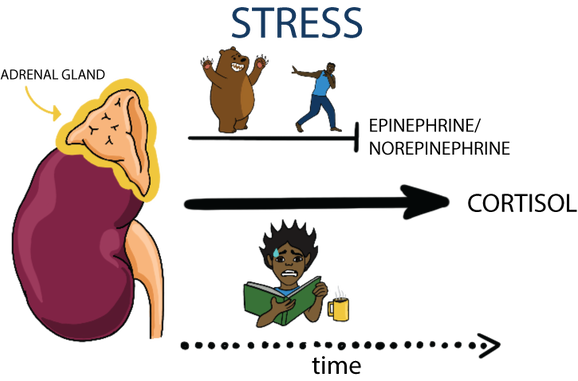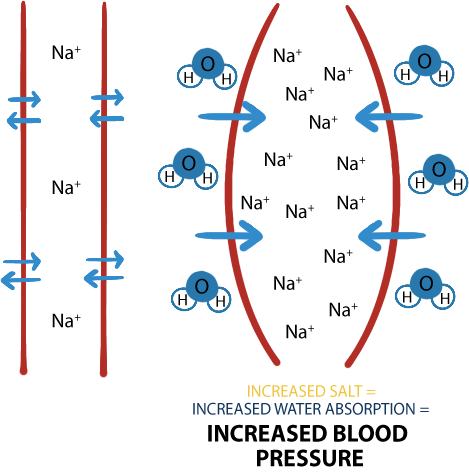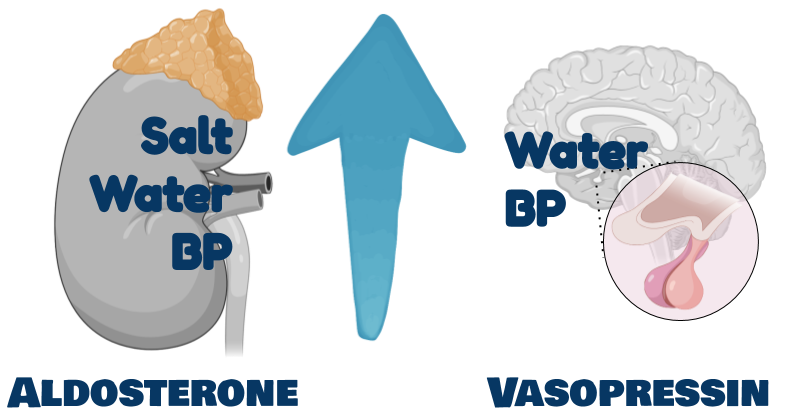hormones
Now that we know that hormones are important for slow, sustained signalling, sometimes for maintaining homeostasis through feedback inhibition and sometimes for causing change through positive feedback, let’s take a look at the specific functions of some important hormones in your body.
insulin and glucagon (again): blood sugar
I talked a lot about insulin and glucagon in the last lesson, but I’ll briefly mention them again just for sake of completeness. Insulin lowers blood sugar when it is too high, and glucagon raises blood sugar when it is too low. Insulin and glucagon are produced in the pancreas.
thyroid: metabolism
So, insulin and glucagon regulate blood sugar, but how does your body know how quickly to use that sugar? There are a lot of different components that go into that overall control of the body’s metabolism, or how it makes and uses energy, but one of the most important is thyroid hormone. Thyroid hormone is produced by the thyroid (a great naming mystery, there) and is responsible for raising the body’s basal metabolic rate, among other functions. Basal metabolic rate is the amount of energy your body uses when it is at rest.
People’s basal metabolism falls along a range (some people have naturally faster metabolisms, and some people’s metabolisms are slower), but serious medical problems can result if metabolism gets too high or too low. If your metabolism is too low (as a result of hypothyroidism), you will feel tired and cold all of the time (among other symptoms), because you’re not producing usable energy very efficiently. You will also probably store more fat. If your metabolism is too high (as a result of hyperthyroidism), you will also feel tired and cold most of the time (among other symptoms), because you’re burning through your energy stores too quickly and can’t keep up. You will also have a hard time storing a healthy amount of body fat. Even though thyroid hormone only raises metabolism, it is still what maintains metabolism homeostasis, because it gets shut off once we’re in the right range (feedback inhibition) and turned back on again once we drop out of that range again.
If you’d like to learn more about thyroid hormone, this video gives a great overview:
If you’d like to learn more about thyroid hormone, this video gives a great overview:
cortisol, epinephrine, and norepinephrine: stress
Stress is a useful system by the body that tells it what to do in the event of an emergency. Epinephrine and norepinephrine (also called adrenaline and noradrenaline) are responsible for short-term stress, like the kind that might be useful if you needed to run away from a bear. When epinephrine and norepinephrine go up, blood is sent to your muscles to make you faster and stronger, your pupils dilate to make your vision better, your heart beats faster to supply more blood to your body, your lungs breathe faster to supply more oxygen to your body, and your liver releases stored glucose to supply more energy to your muscles. Basically, you turn into a superhero. (But not actually--you still can’t fly, unfortunately, and laser vision just isn’t in the human arsenal of stress responses). This is the physiological component of your fight-or-flight response (which also involves some rather interesting psychology), and it is how your body gets prepared to fight off or run away from impending danger. All of these temporary changes make it possible for you to get out of danger.
This video gives a great overview of the fight-or-flight response:
This video gives a great overview of the fight-or-flight response:
(Don’t get confused: even though epinephrine and norepinephrine might sound like opposites, they both do essentially the same thing: increase your fight-or-flight response).
If stress continues over the long term, the things your body needs in order to sustain that type of response change. And, since hormones are only programmed to do one set group of things, that means we need a new hormone. Cortisol is the body’s long-term stress hormone. Blood pressure, heart rate, respiration rate, muscle tension, and blood glucose all remain high. But, over the long term, we can’t just keep releasing stored blood sugar from the liver (we run out), so instead we start breaking down muscle and turning it into blood sugar. This is great if we really are facing the type of stress that makes us need all that blood sugar, like if we’re still being chased down by bears every day. It’s not great if we aren’t actually using that blood sugar and are stressed for other reasons, like work or school (unfortunately, your hormones don’t know the difference between when you’re being chased by a bear or when you have a big test coming up). As such, in the modern world, having high cortisol levels is usually considered a bad thing because high blood glucose damages blood vessels (as mentioned) and contributes to diabetes, heart disease, and stroke. This video gives a great overview of the negative health consequences of too much stress:
If stress continues over the long term, the things your body needs in order to sustain that type of response change. And, since hormones are only programmed to do one set group of things, that means we need a new hormone. Cortisol is the body’s long-term stress hormone. Blood pressure, heart rate, respiration rate, muscle tension, and blood glucose all remain high. But, over the long term, we can’t just keep releasing stored blood sugar from the liver (we run out), so instead we start breaking down muscle and turning it into blood sugar. This is great if we really are facing the type of stress that makes us need all that blood sugar, like if we’re still being chased down by bears every day. It’s not great if we aren’t actually using that blood sugar and are stressed for other reasons, like work or school (unfortunately, your hormones don’t know the difference between when you’re being chased by a bear or when you have a big test coming up). As such, in the modern world, having high cortisol levels is usually considered a bad thing because high blood glucose damages blood vessels (as mentioned) and contributes to diabetes, heart disease, and stroke. This video gives a great overview of the negative health consequences of too much stress:
Exercise helps to combat high cortisol levels or unnecessary fight-or-flight activation by using up blood glucose and relieving stress. Other stress-relieving activities include meditation, spending time with people you like being around, and many other enjoyable activities like listening to music, making art, and laughing.
Epinephrine, norepinephrine, and cortisol are all produced by your adrenal glands, which sit on top of your kidneys.
Epinephrine, norepinephrine, and cortisol are all produced by your adrenal glands, which sit on top of your kidneys.
Aldosterone and Vasopressin: Salt Levels and Blood Pressure
Another important balancing act that your endocrine system handles is regulating your salt levels which, in turn, determines your blood pressure. Maintaining the appropriate amounts of sodium and potassium in your body is very important because your nerves require an appropriate balance of these salts in order to function properly. The levels of sodium in your blood also determine how much water you’re able to hold onto: Water follows salt by osmosis, so if you have low salt, you can’t hold onto as much water. This causes your blood pressure to drop, which, if it goes too low, means that you can’t get enough blood to the cells that need it. If you have high salt, you hold onto too much water, your blood pressure goes up, and, over time, this causes damage to blood vessels, which causes heart disease, stroke, kidney failure, and nerve damage (the same problems that happen when blood vessels get damaged in diabetes).
Aldosterone is a hormone released by the adrenal glands (like epinephrine, norepinephrine, and cortisol), and it raises blood sodium and therefore increases water retention and raises blood pressure. It also decreases blood potassium. Vasopressin is released by the pituitary gland in the brain and increases water retention and therefore blood pressure, but it does not have any direct effect on salt levels. Like with thyroid hormone, even though both aldosterone and vasopressin only act to increase your blood pressure, both get shut off (feedback inhibition) once we’re in the right range and turned back on again when our blood pressure falls, which allows us to maintain blood pressure homeostasis.
Growth hormone
|
Can you guess what growth hormone does? It makes you grow! I wonder how it got its name?
More specifically, growth hormone tells the cartilage in your bones to start dividing to make more cells. That cartilage then eventually turns to bone. The end result is a taller person. Growth hormone is most abundant during certain points in childhood and puberty called growth spurts. But, you don’t want to keep growing forever (can you imagine how giant we’d get?!), so there is a negative feedback loop that shuts off the supply of growth hormone once we’ve reached adult height. The effect it caused never gets reversed, though, so growth is considered a permanent change. Growth hormone is released by the pituitary gland in the brain. |
Summary
You should understand:
- The basic roles of the following hormones:
- Insulin: raises blood sugar
- Glucagon: lowers blood sugar
- Thyroid: increases basal metabolism
- Epinephrine and norepinephrine: short-term stress and the fight-or-flight response
- Cortisol: long-term stress and potentially negative health consequences
- Aldosterone: salt regulation and raises blood pressure
- Vasopressin: raises blood pressure, but has no direct role in salt regulation
- Growth hormone: causes growth (in height)
- Insulin: raises blood sugar
- How the concept of homeostasis is important in blood sugar, metabolism, salt, and blood pressure regulation.
- How the concept of change is important in stress.
Learning Activity
Contributors: Emma Moulton
Some images made with biorender.com
Some images made with biorender.com
